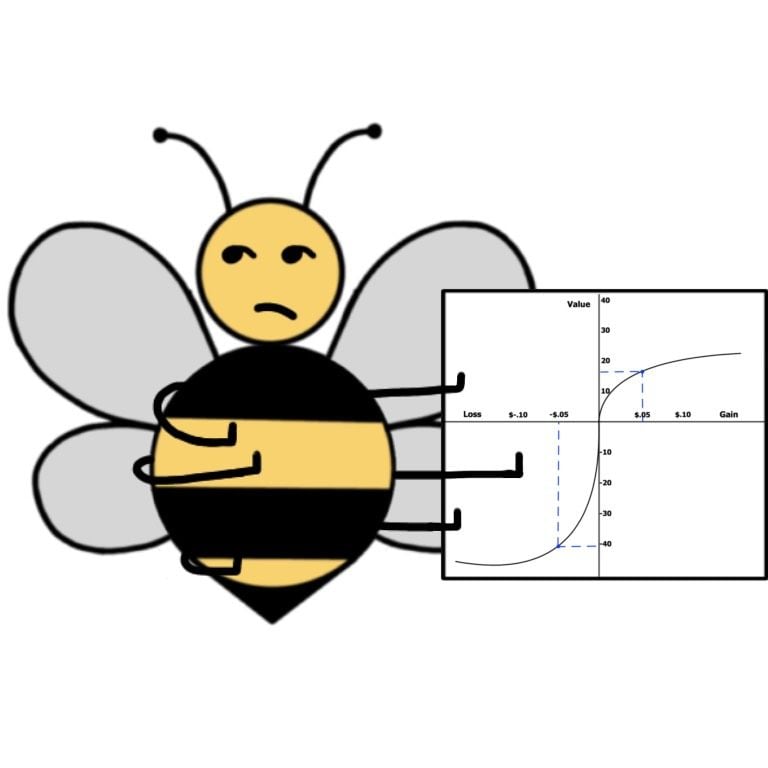
This is part 2 of our two-part series on loss aversion. Previously we explained loss aversion and how it’s distinct from the endowment effect. Here we (as Beeminder) disavow loss aversion as a tool for behavior change. This isn’t like “Ego Depletion Depletion” or other debunking posts we’ve done. We believe loss aversion is very real. We’re just averse to exploiting it.
(Ulterior motive alert: If you were less biased by loss aversion you might risk more money or even treat yourself — perfectly rationally! — to more derailments.)
For years we’ve mentioned on the blog and elsewhere that loss aversion is part of the behavioral economics that Beeminder is based on. We’re now recanting that.
This might sound like Ben & Jerry’s disavowing ice cream. Isn’t “stay on track or LOSE MONEY” our whole shtick? Isn’t being averse to the “LOSE MONEY” part the entire basis of that threat being motivating?
Yes yes, but that’s just loss aversion in the most literal sense. We’re not disavowing incentives altogether. Loss aversion in the behavioral economic sense is a specific rationality failure and it’s that that we’re disclaiming.
Our current stance is that loss aversion may (irrationally!) magnify how much you’re motivated by the threat of Beeminder’s sting but that’s not fundamental to the motivation Beeminder provides.
Magnifying motivation? Like what anti-charities do?
Yes, and we’ve always hated anti-charities. Anti-charities are a way to get more motivation per dollar at risk. Instead of paying Beeminder when you derail, you donate money to the Ku Klux Klan or something. Multiplying the per-dollar motivation is not inherently valuable. (And it’s certainly not worth the risk of donating to the KKK.) Just multiply the number of actual dollars at risk instead!
It’s the same thing with loss aversion. If you’re irrationally over-motivated by losses, you can go ahead and overcome that cognitive bias and then just up your Beeminder pledges to achieve the same motivation. [1]
What about Paul Fenwick invoicing clients?
This is a classic case where we’ve referred to loss aversion but actually meant something else. First let’s paraphrase our friend Paul Fenwick:
I beemind invoicing clients. The invoices are for thousands of dollars. Yet that does not motivate me to get the invoice sent out. What motivates me is the threat of losing $5 to Beeminder because my “send invoices” goal is red. Without the goal, I never send the invoices (or put them off preposterously long etc).
The $5 (and the “oh! Beeminder says I screwed up!”) is a concrete thing that is happening Right Now (or in 3 hours or whatever), whereas the invoice, you send it out, and then the client pays you at some arbitrary point in the future when they feel like it, and so the deadline for sending the invoice is pretty wobbly. The payout is huge, but you don’t really know when it’s coming, and sending the invoice 3 days sooner doesn’t mean you’ll get the money any sooner. Each day, from now to eternity, you think “well, one more day won’t hurt”. Unless you make it so one more day does hurt.
And that is the behavioral economic secret of Beeminder.
Present bias
Beeminder is fundamentally about bringing long-term consequences near aka overcoming present bias and not at all about the loss/gain asymmetry. That asymmetry is irrational and people should fix it and if Beeminder depended on it, that would not be cool of us.
In conclusion, loss aversion is a cognitive bias that we have no interest in exploiting and would prefer to help correct for.
But also, if you’re not fussed about the behavioral economic definition of “loss aversion” and want to keep referring to it in the sense of “I am averse to losing money and that is motivating”, we suppose that’s ok.
Footnotes
[1] Beeminder doesn’t even inherently prefer loss to gains, motivation-wise. If we could give payouts for staying on the right side of the bright red line — instead of penalties for crossing it — that may be motivationally ideal. See also our defense of punishment. But that question is moot because Beeminder has no funding source for that. I mean, we could use the money we collect from derailments to pay people for not derailing but we view our former competitor that tried to do that as a cautionary tale.
Image credit: Faire Soule-Reeves and Wikipedia